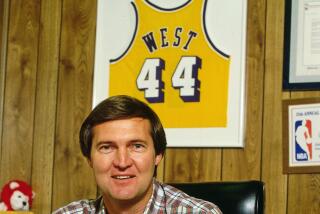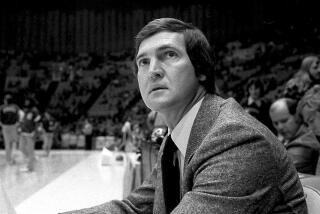Blind Faith: It Won’t Happen to Me
The picture I keep coming back to, the picture I think tells the whole story, is the one we’ve seen on the news: Reggie Lewis and his wife, Donna Harris-Lewis, sitting together, holding hands and smiling as Dr. Gilbert Mudge announces that as far as he is concerned, there is no reason why Mr. Lewis can’t play basketball again.
We see Lewis absolutely beaming, tilting his head toward his wife, in an unmistakable expression of relief--the same as we see in a courtroom when a defendant is declared not guilty by the jury.
The verdict was in:
Reggie Lewis had won the trial. He could play basketball again.
It no longer mattered that a team of doctors had previously diagnosed a life-threatening heart condition--hypertrophic cardiomyopathy, similar to the one Hank Gathers died from--and recommended that Lewis never play again. Lost in the reverie was the strong argument that those 11 doctors were brought together by the Boston Celtics, who stood to lose if Lewis never played again.
Lewis no longer had to listen to any voices of gloom. He’d checked himself out of one hospital and into another to get a second opinion. And he’d gotten the one he wanted:
You can play, Reggie.
In the next few days we’ll surely hear that lawsuits are being contemplated. There is big money involved here, many millions of dollars. And there is outrage. A 27-year-old man with an infant son and another on the way lies dead. How could this happen? Who’s fault is it? Somebody must pay.
We will hear Mudge’s name mentioned in a disparaging way. We’d be wise to remember that Mudge ran Lewis through a battery of tests, just as the Celtics doctors did. Doctors aren’t infallible. We’re the ones who insist they must be. But Bostonians are going to run Mudge out of town far quicker than they ran out Bill Buckner.
What’s the point in assigning villainy? I believe Reggie Lewis would have continued to seek second opinions, as many as necessary, until he found a doctor who’d say he could play basketball. That’s what Lewis wanted: to play basketball. It wasn’t about money. The Celtics said all along they would make good on his contract; Lewis was guaranteed of being a millionaire if he never touched a basketball again.
But put yourself in his place: You’re 27. There is this wonderful thing you do wonderfully well. You love it. You can’t see living without it.
Sure, you can stop.
But you don’t want to.
You wouldn’t want to stop at 67 or 57 or 47. So you certainly don’t want to stop at 27, when you’re convinced you’re bulletproof.
Reggie Lewis didn’t want to believe he had to give up basketball, the thing that excited, enthralled and defined him. How could he be destructible? He was the captain of the Boston Celtics, for heaven’s sake.
I refer you back to those TV clips, where you see Mudge at the podium, saying, “It took us a long time because we wanted to be 100% sure.”
But there is no guarantee. You have Reggie Lewis and Hank Gathers and Owen Brown and Chris Patton to prove that. We are told that to succeed, an athlete has to have a big heart. Nobody ever mentions it has to be a healthy heart as well.
You hear about a sudden death of a Celtics player and you automatically think of Len Bias. But I’m wondering about Monty Williams, who, despite a heart condition, is playing basketball at Notre Dame. What is Monty Williams, currently playing for the United States in an under-22 tournament in Spain, thinking right now? I’ll bet it’s: I know the risk. I want to play. It won’t happen to me.
Reggie Lewis thought that, and why wouldn’t he? Hadn’t basketball been his faithful redeemer? You look at Lewis’ career, and think you see something like destiny floating around it. He spent so much time being undiscovered. He didn’t start on his high-school team until he was a senior. He didn’t play for a major college program.
Now he’s the captain of the storied Boston Celtics, a good bet for the 1996 Dream Team.
Some have taken to cataloging the recent, stunning deaths--of Steve Olin and Tim Crews, Dave Waymer, Drazen Petrovic, Davey Allison, Chris Street, Alan Kulwicki, Jerome Brown, Eric Andolsek, Arthur Ashe, Jim Valvano and now Reggie Lewis--and bemoaning this unwelcome, grisly intrusion into a world of fun and games, as if sports should be immune because they celebrate youth and beauty.
But we all live in the real world. You can’t draw a line and say athletes aren’t part of it. They’re no more immune to drugs and lawsuits and violence and strikes and AIDS and heart attacks than the rest of us. They fall farther because we put them on pedestals.
Whether Lewis would have passed the Celtics’ physical to play in the fall is moot. What we know from Will McDonough of the Boston Globe, who spoke to Mudge just this week, is that Lewis was passing his stress tests and was about to embark on a more-active program.
We know that on Tuesday afternoon Lewis was shooting baskets in the Brandeis University gym, and that he collapsed there. Not scrimmaging. Not running hard. Simply shooting baskets. If it happened shooting baskets, it could have happened anywhere--crossing the street. We know Reggie Lewis died on a basketball court. And we know he was doing something he loved.
More to Read
Go beyond the scoreboard
Get the latest on L.A.'s teams in the daily Sports Report newsletter.
You may occasionally receive promotional content from the Los Angeles Times.










